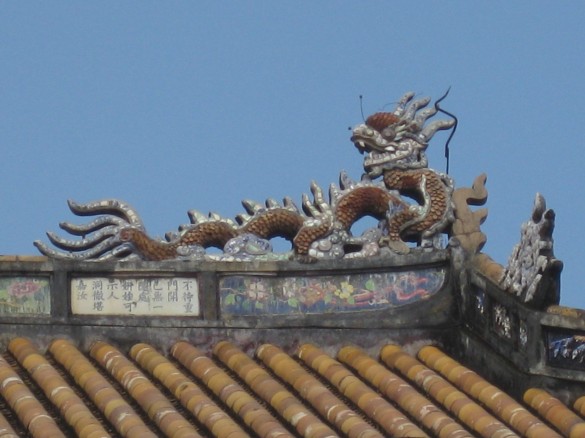Why are hotel breakfasts so awful and why am I always surprised by how awful they are? The only thing that marked this breakfast out from a thousand others was the procession of ants on the breakfast table, dispatched from this veil of tears by the killer hands of my wife and her napkin of terror. For a vegetarian, she can be quite murderous when she wants to be.
I came back to the room, wrote up some notes, showered, shaved and prepared for Hue’s Citadel. It’s two and a half kilometers long, the guide book informed me, but I couldn’t seem to see it from my seventh floor balcony, south of the River, so we went out to take a closer look.
The Citadel was the home of the Nguyen dynasty, but they ruled here, in real terms, for only a short time. Indeed, Vietnam was only finally unified in 1802, and ‘unified’ is perhaps too grand a term, since this pre-industrial empire had only a rudimentary transportation system, the Great Mandarin Road, linking Hanoi in the north with Saigon in the south and Hue, equidistant, sought to rule them both.
Vietnam’s long and difficult terrain made central control difficult even at the best of times, and the empire suffered many revolts and rebellions. Some came from peasants objecting to harsh taxation, corvee labour and the abolition of reforms won under the Tay Son revolts, and some were led by more aristocratic patriots, objecting to the emperor’s Sinification of Vietnam and supporting the alternative Le dynasty.
While Europe was about to expand into its Age of Empires and France was to sketch its grand designs on all of Indo-China, Vietnam was internally divided and embroiled in the affairs of its near neighbours, Loas Cambodia and Siam. The Nguyens, like the Qing to the north, paid little heed to the threat from the West, thinking they could ignore the outside world and slumber in the moral certainties of Confucianism. The Son of Heaven and the Court around him dismissed technology as an irrelevancy. Even when the French took southern Vietnam; even when they took Hanoi; even when French naval cannon blasted through the Citadel walls in 1883 and turned the Nguyens into Gallic puppets; even then they did not modernise, but sat instead, in the gilded cage of the Citadel.
But we still had to find this cage and all the historical background knowledge in the world wasn’t going to help us.


Even taking into account the ravages of war and time and renovation, the temple looks a great deal older than it is. It was only built in 1804, which in much of the world was a time was emperors and kings were being shorn of real power, if not eliminated entirely. The Colonies had become the United States, Napoleon was trampling on the Ancien Regimes of Europe and the Industrial Revolution was about to tear the world apart and set the masses free, giving birth to its terrible beauty. It was not a propitious time for absolute monarchs to set about building vast antiquated palaces and populating them with harems and eunuch courtiers, but Gia Long’s geomancers did not see this coming. It was only a matter of time before some European power came-a-courting.
As I left the Citadel, I wondered if history would have been any different if Vietnam had become a British rather than a French colony, or like Thailand, had been wily enough to avoid colonialism altogether. I tried to interest my wife in a little historical revisionism, but ‘what if’s’ do not a belly fill.
We wondered off in search of sustenance, but the vegetarian restaurant refused to serve us any hot food, labouring under the common delusion that vegetarians are enamoured with cold comestibles. Disinclined to shovel frigid noodles into our respective gullets, we went to an Indian restaurant, and enjoyed 30 minutes of pleasure followed by hours of indigestion.
Feeling tired and disinclined to walk or do anything that required thought, we bought a couple of DVD’s to watch in the hotel room, but their price tag of 50 cents a piece should have raised questions in my mind concerning the quality of the merchandise.
One didn’t work at all and the other kept skipping forward. It was called ‘Facebook’ and from start to finish it only lasted twenty minutes. Unaware of the technical problems, and having already drunk three Bia Hues, I thought it was a piece of avant-guard film making whose plot had jettisoned traditional approaches to chronological integrity. I imagined it would flash back later to all the unfinished chapters, but it never did and I was none the wiser as to the history of the social network and its time-travelling founder.
We left Hue the following day, and as the bus awkwardly made its way through the narrow streets, I tried to chisel out an epiphany and tap it into my netbook. That is how a travel piece is meant to finish, is it not, with a mini-revelation; with a bite-sized piece of insight.
My pantry, however, is empty, and I will not manufacture a eureka moment. I took from Hue nothing that I did not already know: empires decline and fall; war is bestial; and dodgy DVD’s are a risky business.